Faith

Yesterday Kay Stewart shared this at the cemetery as we laid to rest the ashes of her first-born daughter Katherine (“Katie”).
For Christ to have gone before us,
To have kept us from ultimate sadness,
To be our brother, our advocate,
The One who ushers in the Kingdom,
Here
And the One to come,
Does not keep us from our digging today.
We still gather here and throw the dirt on our sacred dust,
We take the shovel like all those gone before us
And surrender to the Unknowable—
The place where
Love and Beauty and Kindness grow wild.
Where sorrow has no needs,
Where there is all beginning and
Nothing ends.
...
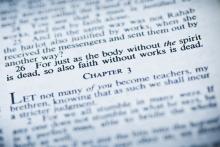
Lately I have been spending a lot of time reading the book of James. Reading this small yet powerful book has challenged me to think and re-think the very nature and meaning of faith.
I have found it interesting to listen to people speak about faith. Often faith is used to describe what a person believes and does not believe. For example, we might say that we believe in God, Jesus, Allah, Mohammed, Torah, the Bible, the Quran, and so forth. What people say they believe is then equated with their faith. Faith in God means that he or she believes in God. Because I believe in God, I have faith. Faith and belief seem to be synonymous.
This understanding or definition of faith, however, does not seem synonymous with actions or the way we live. Although ideally we believe that faith should affect the way we act, we still speak about faith and action separately. In other words, faith and living out that faith — action — is differentiated and understood separately. For example, it might be possible to have faith, yet not live a life that is based or reflects that faith. It might be possible to have faith in God, even in Jesus, but act in ways that are ungodly or un-Christ-like – participating in violence and war, killing, being inhumane, lying, cheating, being corrupt, and so forth. Although we may act in these ways, and participate in actions that are less than holy, the claim remains that we still have faith. We have faith because we believe in something.

Today, three years to the day after my daughter Katherine’s (“Katie’s”) death (May 9, 2010), we inter her cremains. “IT’S RAINING, IT’S POURING” was written the day we learned that Katie’s incurable Leiomyosarcoma had taken a turn for the worse. In memory of Katherine (“Katie”) Elizabeth Slaikeu Nolan.
Gordon C. Stewart Feb. 11, 2009
It’s raining, it’s pouring
The old man is snoring
He went to bed and he bumped his head
And couldn’t get up in the morning
It’s a day like that. I bumped my head on the illness of a 33 year-old loved one. It’s raining sadness. I’m having trouble getting out of bed in the morning.
Terminal illness has a way of doing that unless you believe in miracles of divine intervention or you have extraordinary powers of denial.

Seen on a rural hillside: “Under Construction.”
Someone had added, in letters almost as large, “No equipment, no budget, no crew and no work, but we have the sign.”
For the vast majority of Christians, this sign sums up their philosophy of discipleship.
In their determination to not be ‘saved by works’ they have cultivated a historically isolated, theologically sterile, spiritually impotent ‘faith’ that I can only describe as ‘Christian inertia.'
In this cultivated obliviousness they have forgotten, perhaps deliberately, that we are “created to do good works in Christ” (Ephesians 2:10).
They have somehow come to believe that ‘being a Christian’ is all about having the sign; being transformed (Romans 12:2) by the living word of God, far from being a thriving daily reality, has become an abstraction reduced to a bumper sticker or slogan.

Making an ultimatum about church attendance to a sleep-deprived teenager may be my own version of hell on earth.
“We are leaving for church in 10 minutes,” I said, summoning my most authoritative voice before the lifeless lump under the covers.
My seven-year old Annie Sky watched the tense exchange between me and my 14-year old daughter Maya, who made periodic moans from the top bunk. With furrowed brow, my first grader sat on the couch, as if observing a tiebreaker at Wimbledon with no clear victor in sight.
For a moment, I wondered why I had drawn the line in the Sabbath sand, announcing earlier in the week that Maya would have to go to church that Sunday morning after an all-day trip to Dollywood with the middle school band. Somehow I didn’t want Dolly Parton’s amusement park to sabotage our family time in church. (The logic seemed rational at the time).
When Maya lifted the covers, I glimpsed the circles under her eyes and sunburn on her skin. But I repeated my command, with an undertone of panic, since I wasn’t sure if I could uphold the ultimatum.
When she finally got into the car, I breathed deeply and turned to our family balm, the tonic of 104.3 FM with its top 40 songs that we sing in unison. As the drama settled, I realized one reason why I made my teenager go to church: I want my daughters to know that we can recover from yelling at each other (which we had) and disagreeing. We can move on, and a quiet, sacred space is a good place to start.

Class began at dusk in a dimly lit studio facing Pacific Coast Highway as the yoga teacher appeared, adjusting the shawl draped around his shoulders, and took his seat on a quilted meditation pillow.
Because the sun was setting behind him, the teacher appeared in silhouette. I could only hear his voice as he guided us through the 90-minute Kundalini yoga class – a series of meditations, chanting, vigorous breathing exercises, and asanas (or postures).
“I want you to know that this is a safe place,” the teacher, Cole “Raahi” Jacobs, told us midway through class. “You can feel whatever you need to feel. You are safe here.”
I did. I was.
At the beginning of the year, I embarked on a two-month sabbatical to recover from a rough 2012. I needed to recharge, and resolved to rest, spend time with the people I love most, and find some kind of physical practice that would be restorative.

Back in 2005, I attended a “church growth” seminar in Dallas, Texas. The keynote speaker was Rev. Mike Slaughter of Ginghamsburg United Methodist in Ohio, one of the larger and faster growing UM churches in the country. He shared an experience that sticks with me.
That church had a “Cookie Patrol” that takes cookies to first time visitors. So, every Sunday afternoon, a group of people would meet down at the church to bake fresh cookies to be delivered to potential members.
One day, a member of the church came to Rev. Slaughter and told him, “I just love to bake, and I want to help with the Cookie Patrol. I’ve got a great kitchen at home, so let me tell you what I’ll do. I’ll make several dozen cookies each Sunday and bring them to the church. I just don’t have time to spend at church on Sunday afternoons.”
Pastor Mike responded, “You don’t understand. We don’t need your cookies. We need you.”
When Karen Hunt Ahmed and her Muslim husband divorced four years ago, many friends asked her, “Now you can stop this Islam stuff, right?”
Some friends, she thought.
“Like it was a hobby I took up when I got married and now I’m supposed to drop it,” said Hunt Ahmed, president of the Chicago Islamic Microfinance Project, which she founded with two colleagues in 2009.
Hunt Ahmed, 45, is part of a growing sorority of female American converts to Islam, especially those who are or were married to Muslim men, who must deal with the perception that they converted to Islam because of domineering boyfriends or husbands.
The stereotype was revived in the wake of the Boston Marathon bombings, when news emerged that the wife of bombing suspect Tamerlan Tsarnaev, Katherine Russell, converted to Islam after meeting Tsarnaev in 2009 or 2010 when she was about 21.
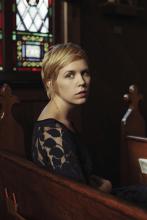
A while back I had an opportunity to sit down and talk with up-and-coming singer-songwriter Nataly Dawn about faith and songwriting. Dawn grew up in France, went to Stanford for undergrad, and made it big on YouTube with a duo called Pomplamoose before signing with Nonesuch records and starting her solo work.
This interview was edited for length and content.
Nataly: I have to warn you, I’m in a little bit of a food coma; I just made a really big brunch. I had probably five pancakes.
Brandon: Wow. Impressive. That’s awesome.

We tend to consider the crucifixion, the resurrection, and Pentecost in two ways primarily. We see them as history, stories about things that happened a long time ago. Or we consider them through theologies about what they mean for us after we die.
Yet, there is a deeper reality to all of them. The cross, the empty tomb, the moment of divine inspiration are repeated every day and everywhere. They’re ongoing and participatory.
Many experience those moments of inspiration each day. They’re moved to help someone who is hurting, inspired to care for those who are struggling, emboldened to try to change their world in some way. They sense something divine in the small moments of life. They stand up for anyone who is being treated as less than an equal child of God. They see love at work all around them.
Spirit-filled moments happen every day.

Two days after the Boston Marathon bombings, Boston Medical Center chaplain Sister Maryanne Ruzzo was checking on staffers who’d been caring for the injured when she received a page. A bombing victim wanted to see her.
The bedside was fraught with worry. A woman in her 30s had lost a leg to amputation as surgeons deemed it unsalvageable. Still suffering multiple injuries, she was now heading into surgery again, knowing she might wake up with no legs at all.
Ruzzo stood among the woman’s parents and siblings and did what she does best: listen. She heard their fears, including concern for the woman’s husband, who was being treated at a different hospital and who also might lose a leg to amputation. Then she prayed.
“Other people might not want to feel the pain and say, ‘Oh, it’s going to be fine,’” said Ruzzo, the Archdiocese of Boston’s coordinator of Catholic services at BMC. “We just try to be present and listen to them. … I prayed for the surgeons and the nurses.”
In a week when Boston hospitals cared for more than 170 bomb victims, staff chaplains were suddenly in great demand. They moved calmly from emergency departments to waiting rooms and employee lounges, offering a compassionate ear and much-needed comfort to anxious patients, family members and staffers.
Nearly eight years ago, professor Richard Lischer got a call on his cell phone that would tear at his heart and test his faith.
It was his grown son, a successful lawyer, telling him his cancer had returned.
The ensuing 95 days in which Lischer — a man used to offering pastoral advice to others — stood by his son, Adam Ewers Lischer, as he lost his battle to cancer is now the subject of an eloquent memoir, Stations of the Heart.
Grief as the subject of memoir is now commonplace. But this volume, written by a professor of preaching at Duke Divinity School, conveys not only the anguish of grieving families, but also offers testimony to a faith that is tested but survives.

HOUSTON — Sunday mornings at Houston Oasis may look and feel of a church, but there’s no cross, Bible, hymnal, or stained glass depictions of Jesus. There’s also nary a trace of doctrine, dogma, or theology.
But the 80 or so attendees at this new weekly gathering for nonbelievers come for many of the same reasons that others pack churches in this heavily Christian corner of the Bible Belt — a sense of community and an uplifting message that will help them tackle the challenges of the coming week, and, maybe, the rest of their lives.
“Just because you don’t believe in God does not mean you do not need to get together in community and draw strength from that,” said Mike Aus, a onetime Lutheran pastor who is now an atheist and founder of Houston Oasis.
“We are open to any message about life as long as no dogmatic claims are made.”
Freedom has always been important to Americans, but a short-sighted definition of freedom has played havoc with the common good recently. Communities, essential to our survival and well-being, are suffering.
All communities have rules. In my faith community, there are two great commandments: Love God and neighbor (even enemies). It’s a difficult balance, but when I manage it, I experience freedom from fear, a major reason that I joined the church in the first place. Those two basic rules have held up well, especially as my neighborhood has expanded to include the whole world.
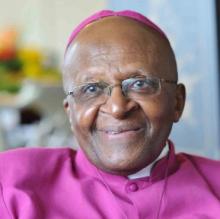
Desmond Tutu, the former Anglican archbishop of Cape Town, South Africa, who won a Nobel Peace Prize for his battle against apartheid, has won the 2013 Templeton Prize, which is billed as the most significant award in the field of spirituality and religion.
Tutu, who has not been afraid in recent years to criticize leaders in his country and across Africa for humanitarian and political shortfalls, was cited for his work in advancing the cause of peace and the spiritual principles of forgiveness.
“By embracing such universal concepts of the image of God within each person, Desmond Tutu also demonstrates how the innate humanity within each of us is intrinsically tied to the humanity between all peoples,” Dr. John M. Templeton, Jr., the president and chairman of the John Templeton Foundation, said in a video statement released Thursday announcing the $1.7 million award.
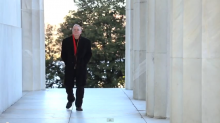
I recently went back to the Lincoln Memorial to tell the story of how and why I wrote my new book, On God’s Side: What Religion Forgets and Politics Hasn’t Learned About Serving the Common Good. And I reflected on my favorite Lincoln quote, displayed on the book’s cover:
“My concern is not whether God is on our side: my greatest concern is to be on God’s side.”
I invite you to watch this short video, and to engage in the discussion as we move forward toward our common good. Blessings.
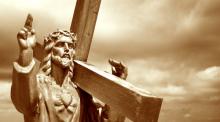
Last weekend – Easter – was a time where all Christians remember the tragic end of Jesus’ life, as well as the miraculous raising of Jesus the Christ from his death. The week prior to Jesus’ death – Holy Week – is one where Christians focus on Jesus’ arrival and entry into Jerusalem, the hub of Israeli and Jewish power, amid excited and adoring crowds. As we read through and remembered this tragic story, we heard and saw the excitement and adoration of the people quickly turn, resulting in a call by the people to kill – crucify! – this man they so enthusiastically welcomed. Not only do the people cry for his death, but they answer Pilate’s question by declaring let “His blood be on us and on our children” (Matt. 27:25). The multitude, in other words, embrace the responsibility for Jesus’ crucifixion, whereas Pilate, ironically, acts like a good Israelite seeking to separate himself from a deed that violates covenant justice (Gardner, 390). The result of the people’s eagerness, which was fed, we are told, by the chief priests and elders’ ability to persuade the multitude, lead to the death of Jesus on the cross.
My fear, however, as we remember the horrible and horrific event of the crucifixion, is that we have forgotten much of its significance, both historically in Jesus’ time and for us today. What we now call the “substitutionary atonement theory” has understood the cross primarily as the beginning of salvation, and not also as the culmination of a radical life lived within an Empire. This theory has tended to disconnect the life-path chosen by Jesus from the salvation attributed to the cross. The cross, as represented in the New Testament, is both an end and a beginning. It demonstrates the predictable end of life lived in service to the Kingdom of God within an Empire. It also invites us into a future in which the power of this life-ending cross becomes the power of a cross-initiated life.

I’m no postmodern theology expert, so I’ll leave it to the pros to explicate more about what’s what in postmodern thought. But for me, the exciting work revolves around supplanting things like binary, propositional “truths” about God with more inductive, open-ended notions of the Divine that transcend religious doctrine or even our own mental constructs of God. This is both a necessary and a liberating process, I think, that indeed can lead the Church (big C Church, that is) toward something far more reconciling and healing for humanity than the modernist approach to faith we’ve employed for many decades now, if not some centuries.
It’s helpful to look back a little bit at where we’ve come from in our religious and theological evolution of thought and practice. At the risk of geeking out on something that puts everyone to sleep, I’ll try to make this quick and fairly painless. Interestingly, it can be argued that the more fundamentalist strain of Christianity can trace its origins back to the “liberal” thinking following the Enlightenment that suggested all things – faith, God, and religious thought included – could be explained by rational means. This hyper-rationalism sought to build up rhetorical constructs that made a case for God, so to speak, as well as buttressing the doctrines of the Church.
Books
Faith meets science
- Scientist Katharine Hayhoe and her spouse, evangelical pastor and writer Andrew Farley, gently and wisely respond to the concerns of those who deny the reality of climate change in A Climate for Change: Global Warming Facts for Faith-Based Decisions (FaithWords). An accessible exploration of the science behind climate change and the faith-based reasons why Christians can and must act.
- Ben Lowe, of Young Evangelicals for Climate Action, describes the rise of climate leadership on Christian college campuses in Green Revolution: Coming Together to Care for Creation (IVP Books).
- In Global Warming and the Risen LORD: Christian Discipleship and Climate Change (Evangelical Environmental Network), Jim Ball offers biblical and spiritual resources needed to meet the challenge.
- No Oil in the Lamp: Fuel, Faith and the Energy Crisis (DLT Books), by Andy Mellen and Neil Hollow, is part science manual, part Bible study and points toward a Christian theology for resource depletion and "peak oil." The unexpected foreword by the CEO of a top U.K. energy company adds depth.
- God, Creation, and Climate Change: A Catholic Response to the Environmental Crisis (Orbis Books), edited by Richard W. Miller, collects original essays by leading Catholic theologians and ethicists to give theological and biblical perspectives on our environmental crisis.
- Green Discipleship: Catholic Theological Ethics and the Environment (Anselm Academic), edited by Tobias Winright, is a compendium drawing on scholars from the fields of ecology, biology, history, and sociology, and includes study group aids. It also has the text of "If You Want to Cultivate Peace, Protect Creation," a January 2010 speech by Pope Benedict XVI, which can also be found at www.vatican.va.
- Sacred Acts: How Churches are Working to Protect Earth's Climate (New Society), by Mallory McDuff, looks at local churches' best practices to reverse climate change.
NEW YORK CITY has been bombed at least twice in the past decade. First by al Qaeda and second by Hurricane Sandy.
In the wake of the Sept. 11 attacks, the United States launched two ground wars and a worldwide "war on terror." Within two months, Congress federalized the Transportation Security Administration to secure airports. More than 263 government organizations were either created or reorganized. Some 1,931 private companies were put to work on counterterrorism, homeland security, and intelligence. Rightly or wrongly, America moved heaven and earth to stop terrorism in its tracks. It was seen as both an ongoing threat and a moral affront that had to be dealt with.
What about Climate Change?
In February, a New York State Senate task force on Superstorm Sandy compared the hurricane that affected 24 states to the 9/11 terrorist attacks. "[On 9/11] there were more than 3,000 souls lost, but in terms of the geographic destruction, it was isolated to Lower Manhattan," said Sen. Andrew Lanza (R-Staten Island). "[After Sandy] we have miles and miles and miles of destruction. Hundreds of thousands of homes affected, 60 ... New Yorkers killed, 250,000 to 260,000 businesses affected."
Hurricane Sandy killed 253 people in seven countries. It was the second largest Atlantic hurricane ever recorded—and the most expensive. It smashed into the East Coast with barely three days' warning. Like hurricanes Katrina and Rita before it, Sandy was a disaster of biblical proportions.
After 9/11, Americans knew in our gut that something was seriously wrong. Our moral intuition had been sucker punched.